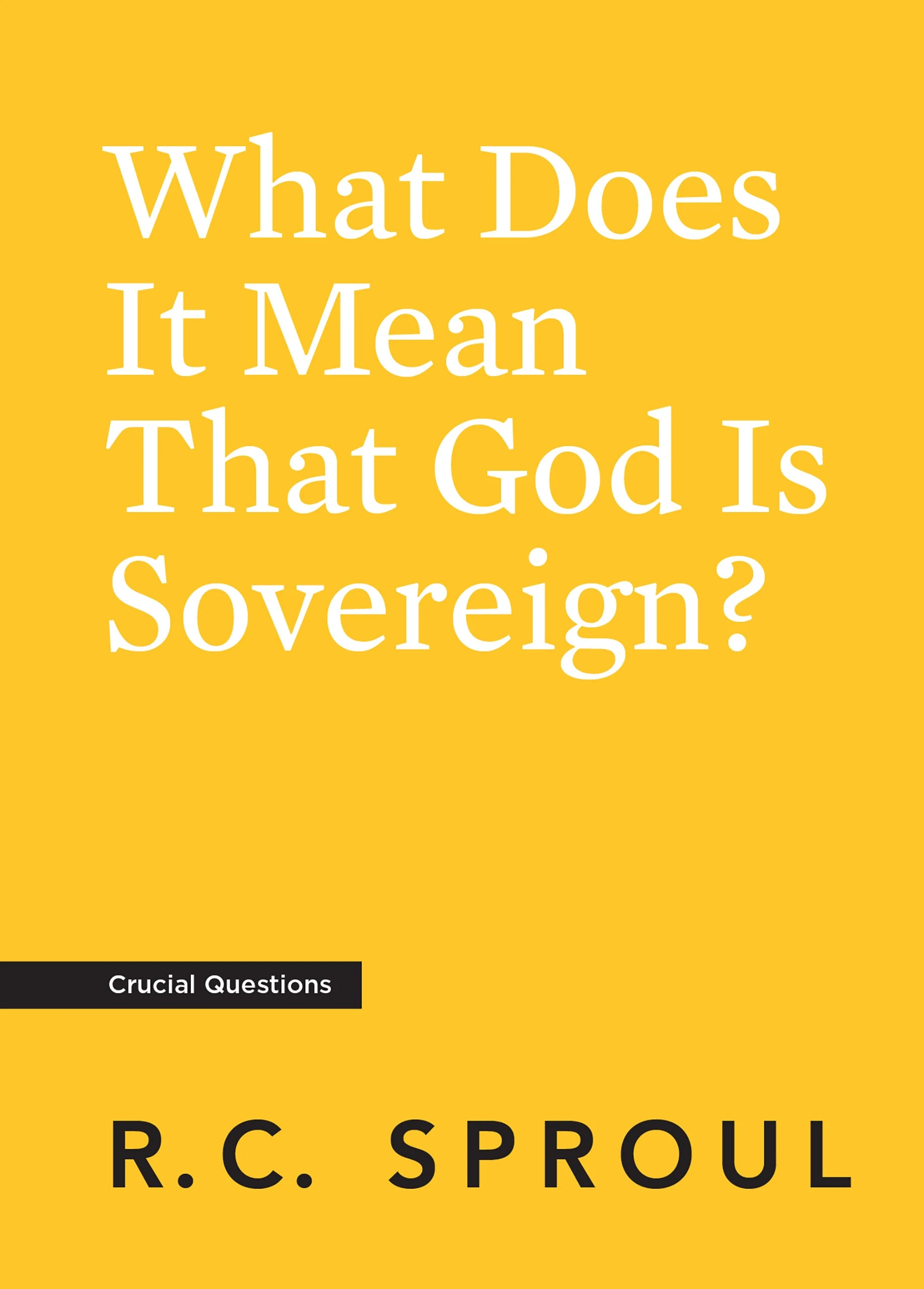What Does It Mean That God Is Sovereign?

Sometimes Christians get confused about predestination and free will, as if they are opposites. We must understand that free will is not simply a pagan concept, though the pagan conception enjoys widespread approval. Christians also believe in free will, but the free will that we believe in is not the humanistic or pagan version of it. One secular idea that has been pervasive in the church today is the humanistic doctrine of human freedom that says that our will, even in our fallen condition, remains indifferent and equally able to incline ourselves to the good or to the evil. It ignores the biblical revelation that though we have the power of choosing, our choices are in bondage to sin. Only the power of God the Holy Spirit can rescue us from that bondage, that spiritual death, and that paralysis.
We have to get our view of the human will not from the secular culture but from the Word of God. Not only are we deficient at that point, but also the pagan world has intruded into our thinking the idea that this world functions according to internal independent laws of nature and of physics.
The idea is that the universe operates moment to moment under its own steam without the transcendent sovereign power of God enabling it and ordaining it. I cannot lift my arm, for example, apart from the power of God. Whatever power I have in my right arm to exercise my will is at best secondary in its causal expression, but all the things that I do in this world are done under and because of the transcendent sovereign power of God.
Some say God is sovereign, but God’s sovereignty is limited by human freedom. If that were the case, then who is sovereign? We have been given a measure of freedom by our Creator, but our freedom is always and everywhere limited by God’s freedom. God is sovereign, not we ourselves, and His sovereignty extends to all things, not only the creation of the world but the sustaining and governing of the world, and what we describe as the laws of nature only describe the ordinary ways that God in His sovereignty governs nature.
If there is one maverick molecule in this universe running free from the sovereign control of God, we have no reason to believe any future promise that God has made, because that one maverick molecule may be the very thing that will destroy those plans. But thanks be to God, there are no maverick molecules running loose outside of the scope of God’s sovereign government.
I once was asked to teach a seminary course on the theology of the Westminster Confession of Faith. When we got to the section of the confession on the eternal decrees of God, the seminary students brought their non-Reformed friends to the class. And to this group of inquisitive seminarians I read, with no explanation, the first section of this part of the confession: “God from all eternity did . . . freely, and unchangeably ordain whatsoever comes to pass” (WCF 3.1). I then asked: “How many of you believe that? How many believe that God immutably and eternally ordains every single thing that comes to pass?”
Now, I was in a Reformed seminary. So, it wasn’t astonishing that 175 students raised their hands. In any other general seminary, that would have been astonishing. But about seventy-five students didn’t raise their hands.
I then asked, “How many of you would describe yourselves as atheists?” No students raised their hands. I said: “There’s just one thing I don’t understand. You didn’t affirm that God ordains whatsoever comes to pass. And yet, you didn’t say that you are an atheist. But if God doesn’t ordain everything that comes to pass, then God isn’t sovereign. And if God isn’t sovereign, then God is not God.”
We have to get our view of the human will not from the secular culture but from the Word of God.
We then examined more carefully what the confession really means. It goes on to say that secondary causes are not eliminated; nor is violence done to the will of man. God is not the author or doer of sin. Centuries earlier, Augustine said that as Christians who believe in a sovereign God, we have to affirm that, in some sense, God must ordain whatsoever comes to pass.
Some people are quick to bring up the concept of God’s “permissive will.” This concept has been invented as a way to excuse God from responsibility for those things we don’t want to assign to Him. But God knows what’s going to happen before it happens. He knows what I am going to say before I say it. He knows what I am going to do before I do it. Does God have the power to stop me? Does God have the right to stop me if He so chooses? If He permits me to commit a sin, He has chosen to permit me.
If He chooses to permit it, He deems it wise that it should come to pass, or else He would not permit it because He does all things well, including the exercise of His sovereignty.
In Genesis 37, we read about Joseph’s brothers, who were guilty and responsible for the sins they committed against their brother, the betrayal and treachery that sent him to languish in prison, removed from his family. Later Joseph said, “You meant evil against me, but God meant it for good” (Gen. 50:20).
Now, the Bible says we are never to call evil good or good evil (Isa. 5:20). Evil is evil, and evil is deserving of divine retribution. But it is good that there is evil, or evil could not be, because all things are under the scope of God’s sovereignty, including our wickedness, which He uses for His righteous purposes. That God can be involved in catastrophic events or in the evil actions of fallen human beings becomes a matter of national interest when catastrophic events such as hurricanes and tsunamis occur. People say, “This is an accident of nature.” But even the insurance companies have enough sense to call these things “acts of God.” When we go beyond natural calamities and look at calamities foisted on us by human wickedness, we find it all the more difficult to think that God’s sovereignty could somehow be behind it.
After 9/11, some Christian leaders opined that the attacks were God’s judgment on the rampant immorality of our culture. Those observations outraged the press, who demanded that the men retract their comments. It was an unthinkable idea to the American public that God could possibly be involved in such a calamity, because apparently they never read Isaiah 45: “I am the Lord, and there is no other, besides me there is no God; . . . I am the Lord, and there is no other. I form light and create darkness; I make well-being and I create calamity; I am the Lord, who does all these things” (Isa. 45:5–7).
Two things happened out of 9/11. First, there was a fresh awakening in the public consciousness about the reality of evil. All of a sudden, moral relativism was arrested as people witnessed an event that they could not regard as morally indifferent but that must be viewed as unspeakably wicked. There was a new acceptance of the idea of sin. Second, there came a revival of interest of God’s blessing a given nation. All over the country—on windows, bumpers, and everywhere else—was the slogan “God bless America.”
Now, the same people who were praying for God to bless America were the people who thought it completely impossible that God could judge America. If you pray that God would bless a nation, certainly in your prayer you must allow for the possibility that He might not, that indeed, if He’s capable of bringing prosperity and peace to a nation, then He must also be capable of withdrawing that blessing and even bringing calamity and wrath on it.
But our understanding of God has degenerated into a cosmic bellhop, a celestial Santa Claus, who exists to serve our needs and to give us nice things when we inquire after Him, but we will not bow before His sovereignty that extends over all things.
I generally say that there are four ways that God is sovereign. He is sovereign over nature. He is sovereign over history and human affairs. And He is sovereign in His inherent right to impose obligations on His creatures, to say to them, “Thou shalt not do this” and “Thou shalt do that.” Do we believe that He has that sovereignty, that right to command obedience from us and impose obligations on us?
Every time we sin, we challenge God’s sovereign right to command what we should do. Some Christians believe that God is sovereign over nature and history and morality but not over His grace. They deny that He has the eternal inherent right to give His mercy to whom He will give mercy.
I’ll conclude with Romans 11:36: “For from him and through him and to him are all things. To him be glory forever. Amen.” From Him: He is the source, the author of all that is good, true, beautiful, and real. Through Him: by means of His sovereign power and agency. Not only do all things come from Him, but they come by means of His power. To Him: the purpose for all things is not me. It is not you. It is Him. All things are from Him, through Him, and to Him, or we could say for Him. And it ends with a doxology: “To Him be glory forever.” Soli Deo gloria, to God alone the glory.


